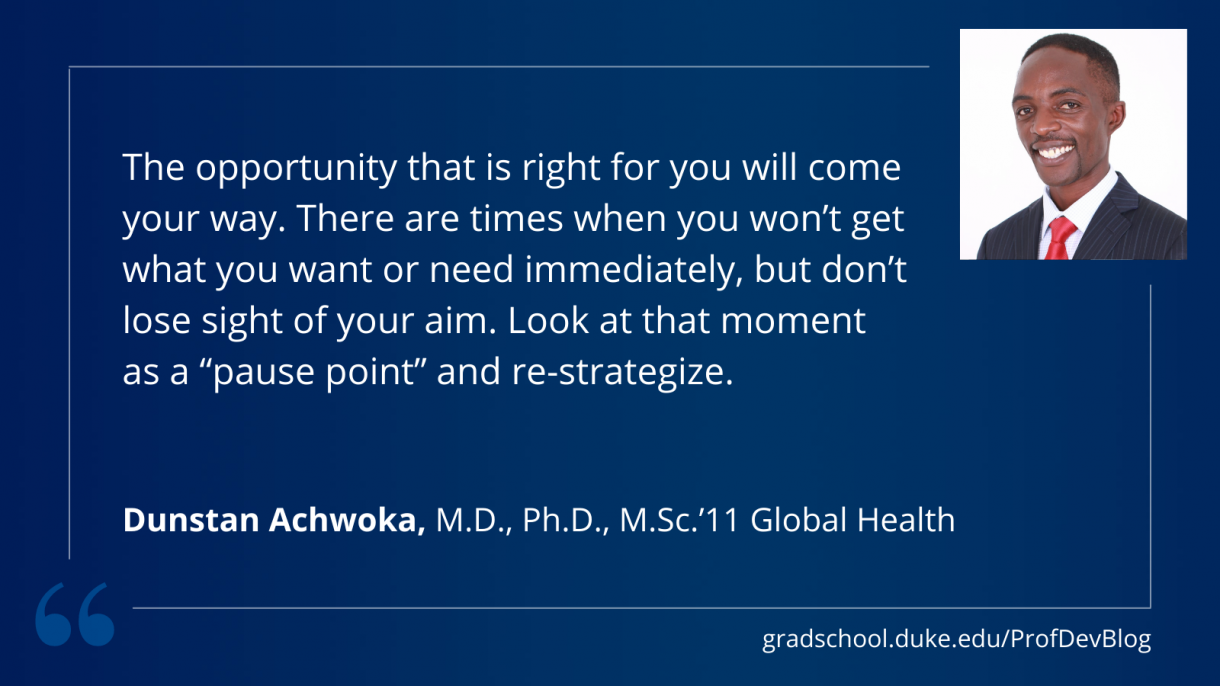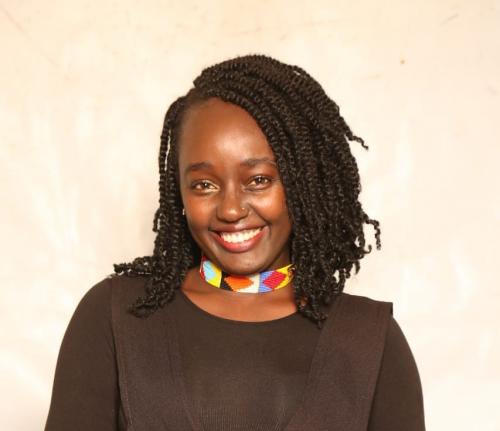
Blog
Alumni Profiles Series: Dunstan Achwoka
Dunstan Achwoka, M.D., M.Sc., Ph.D. received a master’s degree in Global Health from Duke in 2011. Previously, he had served as a medical officer in Kenya after receiving a bachelor’s degree in Medicine and Surgery from Moi University. He also holds a Ph.D. in Tropical Infectious Diseases from the University of Nairobi.
What has your career path looked like since you graduated?
After graduating in 2011, I went back home to Kenya. I always knew I wanted to serve my home country.
I didn’t have a job waiting for me, but I was lucky to get a short stint at Jacaranda Health where I practiced maternal health. Here I got to draw from my prior experience in obstetrics. Then a contact I had made while at Duke came through and, in mid-2012, I started work at FHI 360 as a Senior Technical Officer doing Monitoring and Evaluation. After close to three years, I moved to the CDC and eventually to USAID Kenya and East Africa where I am a deputy team leader and a Program Management Specialist in HIV Care & Treatment.
What informed your decision to pursue graduate studies in global health?
I graduated in 2005 from my undergraduate studies and began working as a medical doctor in some rural towns in Kenya. I enjoyed it but I soon started yearning for some change, so I moved to a remote area of Kenya called Loitokitok to serve in a village clinic. Besides my usual clinical duties, I was involved in HIV and malaria care where we provided bed nets to the villagers. I found that I loved that aspect of public health so much that I decided to formalize it with further training. And that is how I found my way to Duke doing a master’s in Global Health.
What did you enjoy the most about your studies at Duke?
There was so much to learn and a wide array of courses from which to choose. I enjoyed every bit of it. It helped that we had mentors and advisors to hold our hand while we figured it all out. I also enjoyed my research project that was focused on positive outcomes for orphans (POFO) at Duke—that project cemented my reason for pursuing global health: I wanted to serve the underserved.
What does your role as a program management specialist entail?
I represent USAID Kenya at national technical working groups on HIV led by the ministry of health as well as multistakeholder forums. I am also charged with planning for U.S. PEPFAR [the United States President’s Emergency Plan for AIDS Relief] resources in response to the HIV epidemic in Kenya and providing oversight and technical support to USAID-funded HIV programs in Kenya. Lastly, I participate in operations research and national guidelines development.
Does having such a set job description breed routine?
Not at all. My typical day at work heavily varies. I'd say it depends on the season/month of the year. Some tasks, such as planning for PEPFAR resources, would take the first quarter of the calendar year. And during this time, I would be engaged in stakeholder and interagency meetings with the CDC and DOD. Our meetings would be about resource allocation and justification of results to the office of the Global AIDS coordinator (OGAC) in Washington.
In other months, I'd be out in the field monitoring implementation of HIV programs from service provision, expenditure and conducting evaluations. And on an ad hoc basis, I'm called upon by the national HIV program to contribute to developing policy documents and guidelines on HIV service delivery. Besides these bucket activities, there are administrative activities around managing teams, responding to the front office and planning for delegations from Headquarters.

Which part of your current job excites you the most?
That would be coming up with the country operations plan for 2022-2023. Determining what we need to do differently this year for the HIV program is exciting and challenging, and I quite enjoy engaging the government while coming up with a plan for the epidemic in Kenya. It is fulfilling to be a part of a team that provides real-life examples of what it is to implement HIV programs.
As a team leader, what are some of the things you have learned about leadership?
I manage a team of five program management specialists and a program assistant. These are highly qualified professionals, mostly medical doctors. I've learned that delegation is very important when managing teams. I define clear roles and allow my team members to function independently. This allows each team member to be creative within their space and take charge of their work area. I also encourage the team to check in regularly with me and routinely have sessions where each of us shares their work. As a leader, I always recognize each team member's contribution to an outcome through awards.
What was the best career advice you ever got?
While I was working for the CDC, one of my bosses, Kevin DeCock, told me that I needed to be on a path of continuous learning and seek opportunities to always improve who I was. I have tried to follow that advice.
Any wise words for those who are on the hunt for a job?
Don’t limit yourself. Be patient. The opportunity that is right for you will come your way. There are times when you won’t get what you want or need immediately, but don’t lose sight of your aim. Look at that moment as a “pause point” and re-strategize.
Author

Judith Mwobobia
Master's student, Global Health
Judith Mwobobia is a global health graduate student at Duke University. She is currently immersed in cutting-edge research in health and science issues affecting the world. She majored in microbiology for undergraduate studies and worked as a journalist in Kenya. Her current interests are in health journalism and policy-making, two diverse fields that she believes she can use to improve health and health equity in marginalized regions of the world.